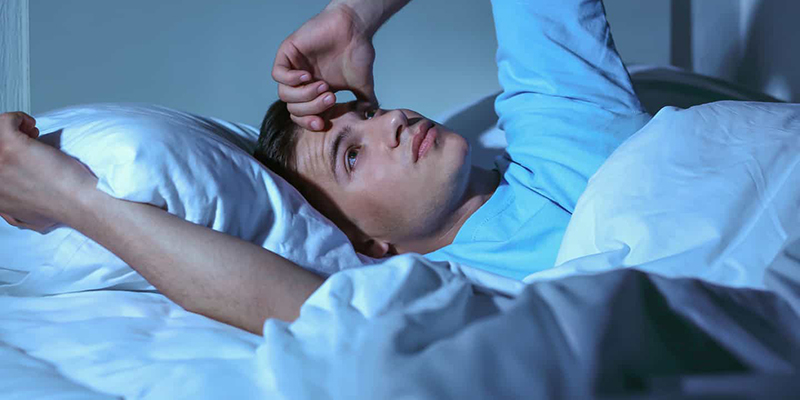What Are The Causes And Symptoms Of Dyssomnia?
Sleep is an essential aspect of our health, with disorders affecting millions globally, among which dyssomnia stands out as one of the most common. Dyssomnia refers to a variety of conditions that obstruct restorative sleep, which can manifest as difficulties in falling asleep, maintaining sleep, or obtaining restorative sleep.
Sleep is an essential aspect of our health. Disorders affect millions globally, and dyssomnia stands out as one of the most common. Dyssomnia refers to various conditions that obstruct restorative sleep, manifesting as difficulty falling asleep, maintaining sleep, or obtaining restorative sleep.

Understanding the causes and symptoms of dyssomnia is vital, not only for effective management but also for empowering individuals to seek suitable treatments. If left unresolved, dyssomnia can lead to significant physical and mental health complications, affecting productivity, mood, and overall well-being. Therefore, thoroughly exploring this disorder is crucial to foster awareness and promote healthier sleep habits among those affected.
Defining Dyssomnia
Dyssomnia is a comprehensive category of sleep disorders that interferes with one's ability to attain restorative sleep, thereby impacting everyday functioning and overall health. It encapsulates various forms, most notably characterized by difficulties in sleep quantity or quality. The two primary categories of dyssomnia include insomnia, where individuals find it hard to either fall asleep or stay asleep, often resulting in excessive fatigue during the day, and hypersomnia, which is marked by extreme sleepiness during daytime activities and extended periods of nighttime sleep. Additional forms include circadian rhythm disorders, representing an imbalance between one's biological sleep-wake cycle and external environmental cues, and narcolepsy, a condition associated with sudden and unmanageable sleep episodes. Gaining clarity on these distinctions is essential for recognizing and addressing the unique challenges of dyssomnia, thus allowing for the development of effective management and treatment protocols.
Causes Of Dyssomnia
Biological Factors
Biological influences are critical in dyssomnia, where genetic predispositions significantly impact sleep patterns. Numerous studies indicate that familial patterns of sleep disorders can be inherited, pointing towards a genetic basis. In addition, hormonal fluctuations, particularly regarding cortisol and melatonin levels, can disturb regular sleep-wake cycles. For example, heightened cortisol levels due to Stress can trigger insomnia, while insufficient production of melatonin can impede falling asleep. These biological aspects intertwine, creating complex interactions that profoundly influence sleep patterns and quality.
Psychological Factors
Psychological elements are equally important in the development of dyssomnia, especially in the context of mental health disorders. Conditions like depression and anxiety are frequently associated with disrupted sleep patterns. Individuals struggling with depression often experience worsened insomnia from pervasive feelings of hopelessness and fatigue, establishing a detrimental cycle. Anxiety disorders can also exacerbate an individual’s hyperarousal state, making relaxation and sleep more elusive. Effectively addressing these mental health challenges is crucial for alleviating their impact on sleep quality and overall mental health.
Environmental Factors
Environmental conditions, such as noise and light, also contribute significantly to the development of dyssomnia. Noise disturbances in urban settings, including traffic sounds or other loud environments, can interrupt sleep cycles, preventing restorative rest. Likewise, exposure to artificial light, particularly from electronic screens, can suppress melatonin production, complicating the ability to fall asleep. Creating a suitable sleep environment by reducing noise levels and controlling light exposure is key to improving sleep quality. Awareness of these environmental factors can be beneficial in managing dyssomnia effectively, paving the path for better sleep hygiene practices.
Symptoms Of Dyssomnia
Dyssomnia incorporates a variety of sleep disorders that notably affect an individual's ability to achieve restful sleep. Recognizing these symptoms is essential for proper identification and subsequent treatment.
Insomnia Symptoms
Insomnia is marked by challenges in falling asleep, staying asleep, or waking too early. Individuals with insomnia often find themselves lying in bed for extended periods without obtaining restorative sleep, leading to considerable daytime fatigue and irritability. The ongoing battle for rest can negatively impact physical health and diminish social interactions and work productivity. Symptoms may also include racing thoughts or anxiety surrounding sleep, making the journey toward slumber even more challenging.

Hypersomnia Symptoms
In contrast, hypersomnia is characterized by excessive daytime drowsiness, manifesting as an overwhelming urge to sleep during conventional daily activities. This condition makes adhering to daily responsibilities increasingly problematic, as those affected may struggle to stay alert. Individuals with hypersomnia might also experience prolonged periods of sleep at night that fail to alleviate their daytime fatigue. Consequently, this condition can significantly threaten regular work schedules and social engagements, resulting in lethargy and self-doubt about their ability to perform basic tasks adequately.
Other Symptoms
Beyond the principal symptoms, dyssomnia can give rise to various other side effects. Cognitive challenges, including difficulty concentrating, memory lapses, and decreased alertness, are common among individuals grappling with sleep disorders. Additionally, mood fluctuations, such as heightened irritability, anxiety, or depressive symptoms, are often consequences of irregular sleep patterns, further complicating interpersonal relationships and professional engagements. Recognizing these additional symptoms constitutes a vital preliminary step toward effectively managing and treating dyssomnia.
Diagnosing Dyssomnia
Diagnosing dyssomnia is vital for implementing effective management strategies, as inadequate identification can exacerbate sleep difficulties. Healthcare providers utilize various diagnostic methods, commencing with thorough clinical evaluations and structured questionnaires to assess sleep patterns, habits, and accompanying symptoms. Sleep studies, or polysomnography, are often employed to observe an individual's sleep stages and physiological responses throughout the night, yielding critical data that can guide treatment choices. Furthermore, home sleep tests may be recommended for patients unable to visit sleep clinics. Accurately diagnosing dyssomnia is essential; it uncovers the underlying causes and informs tailored treatment plans that can substantially enhance sleep quality. Timely and precise intervention can lessen the impact of dyssomnia on daily life, encouraging improved sleep hygiene and general well-being.
Treatment And Management Of Dyssomnia
Treating dyssomnia necessitates a personalized approach, considering individuals' widely varying causes and symptoms. Cognitive Behavioral Therapy for Insomnia (CBT-I) is typically the recommended first-line treatment, equipping patients with strategies to foster healthier sleep patterns through behaviour modification. Additionally, some patients may require pharmacological support, with prescriptions for medications like benzodiazepines or non-benzodiazepine sleep aids to facilitate the initiation and maintenance of sleep. Nonetheless, medication use must be closely monitored to prevent dependency.
Lifestyle changes also serve a critical function in managing dyssomnia. Establishing a consistent sleep schedule, formulating a calming bedtime routine, and minimizing screen time before bed significantly enhance sleep quality. Overall, creating individualized treatment plans that thoroughly evaluate and address dyssomnia's specific causes and symptoms is vital for effective management, facilitating patients' attainment of restorative sleep.







